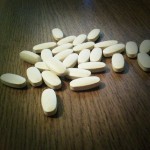 Vanadium compounds have been discovered to mimic many of the metabolic actions of insulin both in vitro and in vivo studies. The most recent vanadium research has tended to focus on vanadyl sulfate and its role in glucose metabolism. However, to date much of the research has been performed using animals such as rodents. The result of these animal experiments have generally been promising, with administration of vanadyl sulfate causing reductions in fasting plasma glucose levels and improvements in peripheral and hepatic insulin sensitivity. Studies in rodents have also shown that oral vanadyl sulfate can improve oral glucose tolerance in diabetic models. Not only can vanadium exert a peripheral insulinomimetic effect which can significantly reduce external requirements for insulin, vanadium also seems able to produce a direct pancreatic insulinotropic effect. Vanadium compounds seem to produce few side effects, with extensive toxicological studies showing that the compound is generally well tolerated in the long term.
Vanadium compounds have been discovered to mimic many of the metabolic actions of insulin both in vitro and in vivo studies. The most recent vanadium research has tended to focus on vanadyl sulfate and its role in glucose metabolism. However, to date much of the research has been performed using animals such as rodents. The result of these animal experiments have generally been promising, with administration of vanadyl sulfate causing reductions in fasting plasma glucose levels and improvements in peripheral and hepatic insulin sensitivity. Studies in rodents have also shown that oral vanadyl sulfate can improve oral glucose tolerance in diabetic models. Not only can vanadium exert a peripheral insulinomimetic effect which can significantly reduce external requirements for insulin, vanadium also seems able to produce a direct pancreatic insulinotropic effect. Vanadium compounds seem to produce few side effects, with extensive toxicological studies showing that the compound is generally well tolerated in the long term.
Fewer human studies have been performed and the results from such trials are more controversial. This may relate to the low dosages administered or short study periods in some trials. Notwithstanding this, some studies have shown positive results for vanadium supplementation, with data showing that high intakes of vanadyl sulfate can improve glycaemic control in human subjects with type 2 diabetes. For example, in one study1 a three week administration of 100 mg per day vanadyl sulfate resulted in increased peripheral glucose disposal and reduced hepatic glucose production. These effects caused a significant blood glucose lowering effect, which was maintained for two weeks even after the vanadyl sulfate was withdrawn. Vanadyl sulfate has been sold as a dietary supplement aimed at athletes for some years, and its longevity on the market and anecdotal reports of its effect suggest that it may be beneficial in humans. However, its effects in healthy individuals may not be as pronounced as in diabetic subjects.
RdB
